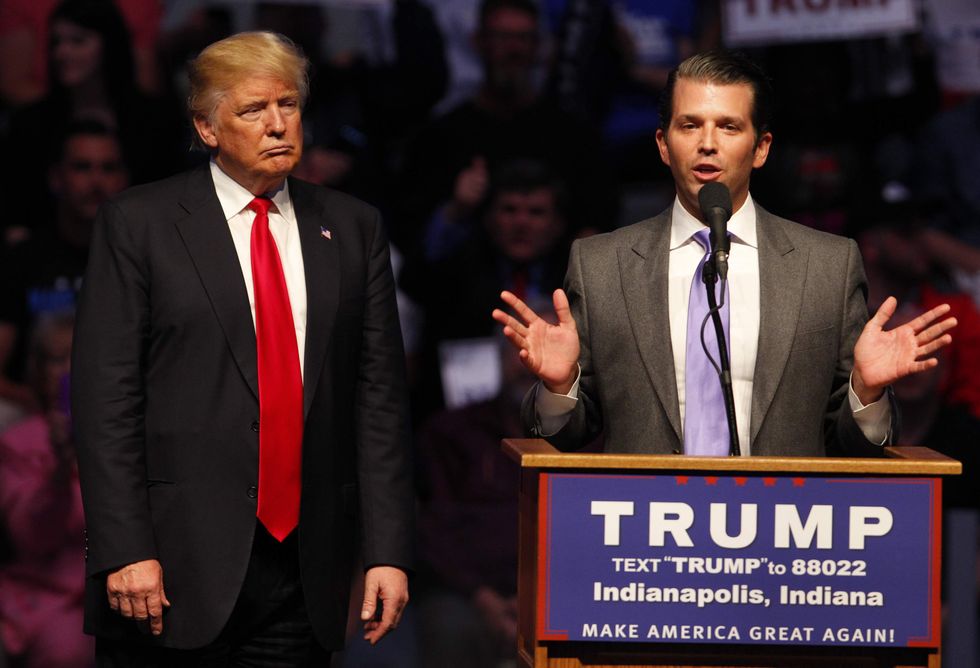
A legal scholar says that Donald Trump Jr. has not committed treason, despite many claims that he has. (John Sommers II/Getty Images)

Famous law professor Jonathan Turley dismissed in an op-ed Tuesday the claim that Donald Trump Jr. committed treason when he met with a Russian lawyer last summer to allegedly discuss damaging information on then-Democratic nominee Hillary Clinton.
The New York Times opened a floodgate over the weekend when it reported on the meeting, which took place June 9, 2016, at Trump Tower shortly after then-presidential candidate Donald Trump secured the Republican nomination. The Times followed up with a story that alleged that the purpose of the meeting was to receive damaging information on Clinton and the Democratic National Committee.
The Times reported that lawyer Natalia Veselnitskaya wanted to divulge potentially damaging information on behalf of the Russian government. Veselnitskaya denied in an interview with NBC News on Tuesday any connection to the Russian government and said the Trump campaign had requested the information, but she never possessed any.
The Times then reported Monday that Trump Jr. was told in an email by an associate who was setting up the 2016 meeting that the Russian government wanted to provide the Trump campaign with "very high level and sensitive information” that would "incriminate Hillary and her dealings with Russia."
Trump Jr. confirmed the existence of the emails Tuesday and released them on Twitter.
Richard Painter, an ethics lawyer who worked in George W. Bush administration, said Sunday that these allegations “border on treason” if not outright amounting to treason.
But according to Turley, Painter is dead wrong.
“[The] question is whether the Trump team is a bunch of click-bait chumps or criminals. In other words, does any of this constitute a clear crime or even a vague inkblot image of a crime?” Turley wrote in an op-ed piece for The Hill.
"No, at least not on these facts,” he said.
Addressing Painter’s comments directly, Turley explained that Trump Jr.’s actions don’t meet the standard for treason established in Article III of the Constitution.
"Trump Jr. went to a meeting on the belief that a lawyer had evidence of criminal collusion by Clinton with a foreign power. That is a rather curious basis for a charge of treason and would make traitors of countless campaign operatives,” Turley wrote.
He then went on to dismantle a claim made by MSNBC analyst Matthew Miller on Tuesday. Miller said Trump Jr. violated a federal law barring "direct or indirect contributions or other things of value from a foreign national.” Miller alleged that one of the “other things of value” is information.
But this would create “unprecedented implications," Turley explained:
Of course, the crux is “other thing of value.” Under this approach, a court would have to include information as a thing of value like money and then declare that Trump Jr. solicited the information by agreeing to go to the meeting. If that were the case, the wide array of meetings by politicians and their aides with foreign nationals would suddenly become possible criminal violations.It is common for foreign governments to withhold or take actions to influence elections in other countries. Information is often shared through various channels during elections from lobbyists, non-government organizations, and government officials. This includes former Clinton aide Alexandra Chalupa, who allegedly worked with Ukrainian government officials and journalists to come up with dirt on Trump and Manafort.
Consider the implications of such an unprecedented extension of the criminal code. The sharing of information — even possible criminal conduct by a leading political figure — would be treated the same as accepting cash. It would constitute a major threat to free speech, the free press and the right of association. It would also expose a broad spectrum of political speech to possible criminal prosecution.
So far, Trump Jr. has denied any wrongdoing, though he told Fox News host Sean Hannity Tuesday that “in retrospect, I probably would have done things a little differently."